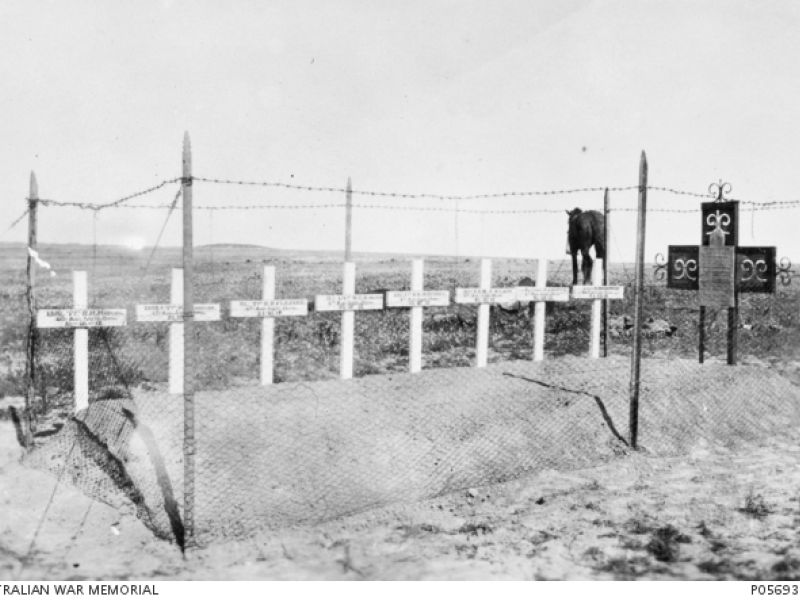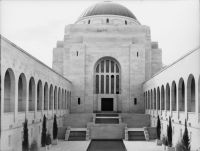Trooper Harold Thomas Bell 4th Light Horse Regiment, Pte Samuel Bell 57th Australian Infantry Battalion
Harold Bell, known as “Harry”, was born in 1901 in Creswick, Victoria to Thomas and Margaret Bell. He grew up on the family farm at Walpeup, near Ouyen, and by the time the First World War began, he was working the family farm with his father and brother, Samuel.
After Samuel enlisted in 1916 and embarked for the Western Front, Bell, despite his youth, was also keen to join up and do his bit.
Bell left home in early March 1917, ostensibly to go droving in Queensland. Instead he travelled to Mildura where on 17 March he presented himself to the recruiters. Using his mother’s maiden name and putting his age up, he enlisted as 21-year-old Harold Thomas Wickham. He also listed an uncle, in actuality, his father, as his next of kin.
Though he only stood at five feet four inches tall, he was an excellent horseman; and after his initial training, he was allocated to the light horse reinforcements. Bell embarked from Melbourne with other reinforcements on 22 June 1917 aboard the transport ship Port Lincoln, bound for Egypt.
After disembarking at Suez in early August, Bell was sent to the isolation camp at Moascar. A month later, he was posted to the 4th Light Horse Regiment.
In late September, the 4th Light Horse Regiment was involved in scouting the Esani to Khalasa area, taking stock of the wells and water supply in preparation for the attack on Beersheba.
The regiment spent much of October around Tel el Fara and were mainly involved in scouting patrols. On 28 October, the 4th Light Horse Regiment, along with the other units of General Harry Chauvel’s Desert Mounted Corps, began their long march towards Beersheba.
The battle began in the early hours of 31 October, with the bulk of the fighting borne by the British infantry. As the afternoon drew towards evening, Beersheba was still in enemy hands.
After a hasty conference, General Chauvel ordered the 4th and 12th Light Horse Regiments to capture Beersheba by cavalry charge. The two regiments had spent the day in reserve, but quickly made ready.
At around 4.30 pm the advance began. Bell’s excitement and trepidation can only be imagined as the horses moved from a trot, to a canter, then a full-tilt gallop for the town – into the teeth of the Ottoman defenders.
During the early stages of the charge, Bell received a bullet wound to one of his legs. The round shattered his femur and sent him crashing from his horse to the ground. He was evacuated by members of the 4th Light Horse Field Ambulance to their temporary dressing station at Khasim Zanna where his wounds were assessed and treated.
But Bell’s wounds proved mortal. He clung to life throughout the night, but died the next morning. He was 16 years and 7 months old.
Harold Bell was laid to rest in a temporary cemetery the following morning, along with the remains of the other men of the 4th Light Horse Regiment who had died as a result of the action that captured Beersheba. Bell was later re-interred in the Beersheba War Cemetery.
When the Bell family were advised of the death of their nephew in Palestine, Bell’s father wrote to the authorities stating that he did not have a nephew by that name, but he did have a son, Harold Thomas Bell. His father had to sign a statutory declaration to correct his son’s identity for the records.
Further tragedy awaited the Bell family. Samuel, serving with the 57th Battalion, was killed on 8 August 1918, near Villers Bretonneux as British and Dominion troops launched the great offensive which led to the end of the First World War three months later.
- AWM Honour Roll https://www.awm.gov.au/collection/R1650183
- AWM Honour Roll https://www.awm.gov.au/collection/R1648525

 Australian War Memorial
Australian War Memorial